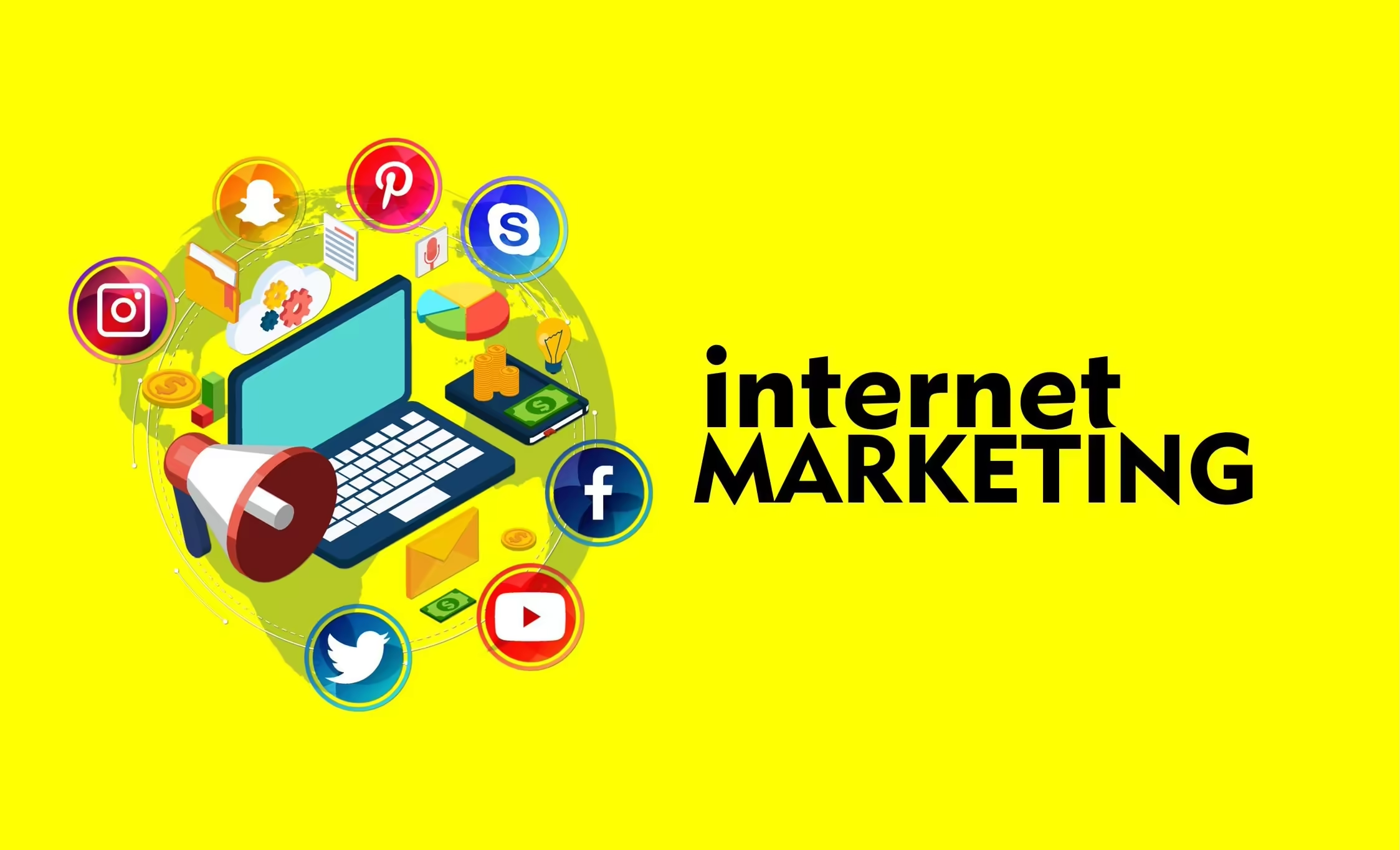Internet marketing is known by several names like online marketing, digital marketing, and numerous others. It has grown into an essential part of the whole marketing plan, and its claim on the marketing budget has remarkably grown since the 90s. The beauty of digital marketing is that it allows smaller brands to successfully compete with big and established brands, which is unimaginable in the traditional marketing setting.
What is internet marketing?
Internet marketing is a component of the marketing process that involves the use of the internet and digital technologies like computers, mobile devices, and online platforms to promote brands and products and to connect with customers
Companies and brands that are going to exist and win in the future are the ones that are successful in the digital space. Brands and organizations are investing in the development and management of internet marketing platforms like websites, blogs, and social media pages. This is especially true in the real estate industry, where an increasingly saturated market demands innovative marketing strategies to make your brand stand out. A professional, user-friendly website is a crucial investment to convert leads into sales. Explore these real estate website templates to kickstart your journey toward a more impactful online presence.
Online marketing is a phenomenon that is cutting across industries and is revolutionizing marketing areas like customer service, branding, sales process, advertising, and distribution. Search Engines like Google and all social media platforms allow for paid ads, and platforms like eBay and Facebook marketplace enables distribution (taking over the P for a place in the 4ps of marketing).
A successful internet marketing process engenders brand awareness and recognition and drives traffic, leads, and sales. Consumers consume more of the news and information via digital platforms, making them influential in shaping consumer perception and, ultimately, decision making.
Elements of Internet Marketing
Digital Marketing Elements
Online marketing is a sum of various components and activities outlined below:
1. Search Engine Optimization (SEO)
SEO is an excellent way of getting free organic traffic from the search engine result page (SERP). Search engines like google and Bing have evolved into modern-day encyclopedias that people go for in search of information.
Every second, Google receives about 77,000 searches. This translates to a total of 2 trillion queries every year. This implies that Google is one of the most effective and profitable search engines.
Organizations are making substantial investments in optimizing their sites. They help brands to come into contact and communicate with people already searching for their services and products. Organic traffic is a good source of sales leads that can then be converted into sales revenue. Click here to read more about the in-depth guide on SaaS SEO by Saaslinko.
2. Search Engine Marketing (SEM)
As opposed to SEO, search engine marketing entails buying traffic from the search engines. Since billions of people use search engines every day, it makes marketing sense for brands to invest advertising dollars on such platforms. With SEM, companies pay to be listed on top of the SERP for specific keywords.
3. Social Media Marketing
Social networks like Facebook, Twitter, Instagram, and Pinterest have become common features of our daily lives. Each social media network is customizing its features to serve specific niches and needs. For example, Twitter is now regarded as a real-time news platform, with it breaking most stories before media houses and is empowering almost everyone. Instagram is more of a visual application featuring pictures and videos. When considering the visuals for your Instagram posts, remember that you can easily access an array of stunning royalty-free videos to make your content stand out. Social Media allows brands to develop digital real estate assets in the form of pages and accounts. These serve the purpose of enabling the organization to actively engage its consumers, participate in the social conversation and shape the narrative. Internet marketing success is unimaginable without active social media participation. Secondly, brands can make paid ads on social media, improving their reach, raising brand awareness, generating leads, and ultimately sales. Another essential attribute of social media is the ability to grow consumer community, which, if properly done, can cultivate and produce powerful brand advocates and evangelists. The power of consumer word of mouth can never be over-emphasized in marketing.
Every day, 3.2 billion people utilize social media, accounting for around 42 percent of the worlds population. You may reach a larger audience and help your company reach new heights if you're good at social media marketing. To further streamline your social media strategy, consider using an ai ad generator to create compelling advertisements quickly and efficiently. This tool can help optimize your campaigns, ensuring you get the best results with minimal effort.
Ways to achieving internet marketing success
1. Coherence, consistency, and synergy with the broader strategy
Digital marketing is not a standalone affair and is not divorced from the broader marketing strategy emanating from the corporate strategy. Problems ensue when the organization fails to place it under the broader marketing plan, resulting in discord and mixed signals to the market. A successful online marketing undertaking is drawn from the overall marketing goals, this sort of integration produces synergies that are essential in achieving organizational goals. In brand communication, it is detrimental to send mixed or conflicting messages, for they work against brand recognition, awareness, identity, and recognition. There its vital to ensure that coherence and unity of the message are attained between online and traditional means of communication. For example, Coca-Cola projects a brand image of coming together and happiness, their message on billboards, TV ads, print ads, Facebook, Twitter, website, etc., is consistent in portraying images of happy people.
Apart from the need to get unity in communication, the digital marketing activities need to pull together with the other marketing activities to attain the set goals. Most organizations make the deadly mistake of implementing internet marketing for the sake of it or because it is the in thing, forgetting that it is a powerful tool that can aid in the efforts. Failure by digital marketing professionals to tie their activities to the organizational success and contribution to its bottom-line results in the inability to get executive buy-in and necessary budget. If the marketing goal is to raise brand awareness, then as the organization invests in TV and outdoor ads, the online marketing team must also create content that introduces the brand to the people. If the goal is to increase sales revenue, then the internet marketing activities must be geared towards conversion methods that turn traffic and followers into customers.
2. Clear Goals
No meaningful internet marketing success can be realized without clear goals that inform strategy and action. Working without goals is akin to shooting without a target, its all but a futile endeavor that usually results in the wasting of organizational resources. Online marketing goals outline the aims and targets that a business seeks to attain through its digital marketing activities. Goals can include but are certainly not be limited to things like raising brand awareness, fostering brand preference, increase sales volume, expanding distribution points, and improving customer service quality. Its essential to ensure that the goals meet the SMART criteria; specific, measurable, attainable, realistic, and timely. To formulate a sensible digital marketing plan and strategy, its essential to have clear goals. Goals inform the strategy, and they help the overall success of the online marketing campaigns.
Furthermore, clear goals help develop online tactics that will be implemented within the digital marketing space. Tactics include online promotions, discounts, Facebook post boasting, LinkedIn polls, contests, etc. Metrics and key performance indicators used to measure the internet marketing campaigns and activities are also derived from the goals.
3. Plan
A plan is a predetermined course of action taken by the business to achieve set goals. It documents the activities and actions that the team will focus on. The element of focus brought by the plan is essential considering the risk of getting astray due to the vastness of the internet marketing world. A deliberate concentration of efforts produces maximum impact in the market. It also clarifies the resources needed for a successful implementation of the internet marketing plan. Without sufficient resources to back it up, any plan is bound to fail, and digital marketing plans are not different. Resources start with human resources that will be executing the internet marketing plan. Different teams are structured differently to conform to the dictates of the plan. Staffing is also determined by the size of the organization and the importance of digital marketing within the broader plan. For a small organization a small team can suffice, even one person carrying out all the activities can do. Big organizations can go as far as having separate teams for content creation, SEO, Facebook management, Twitter, and LinkedIn. A digital marketing plan provides for the financial budget necessary for the execution. This can be used to fund online adverts, sourcing for content, and other things.
4. Tactics
Tactics are the specific actions taken on a short-term basis to pursue the overall goals as outlined in the plan. The managers and leaders usually execute goals and plans, whereas the digital marketing team carries out tactics within the digital space. Tactics are more do to with the execution and implementation of the plan. Shooting and publishing a brand video on YouTube is an example of a tactic, so are blog articles targeting keywords and participating in meaningful online conversations and engagements. Noble goals and brilliant plans are meaningless without a proper tactic, for they are the tactics that produce the required results and necessary growth.
A good plan violently executed right now is far better than a perfect plan executed next week.
-General George S. Patton
Internet marketing success is only realized when an organization ensures that the team implements the right tactics. More time should also be spent on the implementation (tactics) of the plan spent in the formulation.
Digital marketing trends are always shifting and changing, what worked yesterday may be useless today, therefore organizations and teams must always be ready to learn and adapt new skills. To ensure the effectiveness of online marketing tactics, organizations must ensure that the team is always up to date by investing in continuous learning. Platforms like Coursera and Hubspot Academy offer a great course that can keep the team up to date.
5. Measure and control
Measuring results should be the culmination of every internet marketing campaign if success is determined and ensured. Results are usually measured against the goals that the plan sought to achieve. Measurement of results is essential in taking corrective action if there was a failure in meeting the intended goals. Results are also vital in the rewarding of the staff and employees.
Several digital platforms have made it easier to extract reports that show results. Google has Google Analytics, Facebook provides insights, and Twitter also has a built-in analytics section. These provide results and deep insights that are helpful to the organization. There are also third-party companies like Ubersuggest, Semrush, Ahrefs, etc. Reports show what is working and enable the organization to reinforce such things hence ensuring internet marketing success.
Conclusion
Internet marketing is a vital cog in the marketing wheel, and its importance is continuously growing as more and more people adopt internet technologies. Like any other marketing activity, digital marketing must be guided by goals that meet the SMART criteria, plan, strategy, tactics, and must-have measuring elements and control measures.
This article was written by Nicholas Mushayi, a digital marketing consultant at Industrial Psychology Consultants a management and human resources consultants company.

